The second part of the ‘Books and Papers’ category is of course papers. That includes paper files, and any other paper stuff around the house. I thought this would be brief and breezy, but it turned into days of crushing agony. Read on.
Files
I tacked our household files on a Sunday afternoon. After implementing David Allen’s Getting Things Done method a couple of years ago, our files have stayed in fairly good order. We had only one drawer of files. However, going through them took a LONG time.
Kondo’s advice regarding files is to presume total disposal, and then save necessary items from the flames, as it were. I think this approach makes sense, and she’s right that paperwork rarely gives joy, but I was sceptical about how much I could really slim our own file situation. Visas require a lot of paperwork, and between us we have four different visas under our belts. I know from experience that it’s useful to keep copies of previous visa applications, too, for when you have to apply again and can’t remember your last 247 residential addresses.
All this being said, and knowing that I would keep more paper than Kondo recommends, I still tried to take her approach of presuming total discard. I was curious to see the results, because I tend to be ruthless and thorough in periodic file purges, so how much excess did I really have?
In fact, I think I discarded 50% of our files. The shred pile weighed 8 lbs 11 oz, or almost 4 kg. That’s more than Edith weighed at birth!
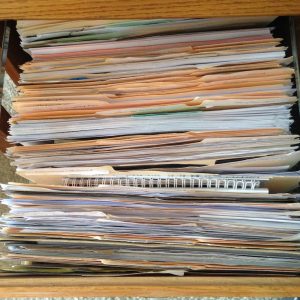
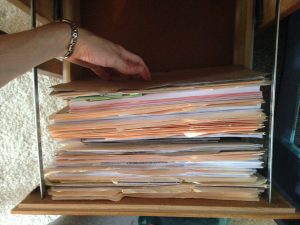
I threw out quite a lot of manuals, although not all; and a lot of old financial documents, including many years of bank statements that I was keeping out of deep dark fear: What if I owe back taxes? Will they hunt me down? David Allen describes this beautifully – that many people have already psychologically put themselves in jail just by thinking about their taxes. Anyway, I breathed a sigh of relief discarding these statements.
One thing I learned from this process is that I often keep papers out of a sense of their importance, without a specific knowledge of what purpose they serve, and consequently, without being able to know when their purpose is finished and I can discard them. It doesn’t help when documents TELL you outright that you must keep them – although with no indication of why.
You already know from my joy at Exam Regulations that I must be a rule follower, so if the statement tells me not to destroy it, what am I to do but keep it INDEFINITELY?!
I also collected all the scraps of paper from around the house, including notes on the bulletin board, receipts and papers from my bags and the pages of notebooks and my Bible. I almost didn’t bother to do this, because I don’t think I have a great deal of clutter of this kind, but I think this kind of thoroughness is part of what makes the Konmari method feel so good and hence succeed. The best analogy I can think of is that, if you’re feeling sweaty and grimy, your first impulse is to change your clothes; but you really need to shower and change your underwear as well to feel really clean.
This generated a bag of recycling and a box of shredding (8 lbs, remember). I ended up burning the shred pile – not the most environmentally friendly option, I realise, but it seemed like the fastest way to get it out of the house without an extra errand. And I must say, it was a therapeutic way to finish a Sunday evening. But then…
University papers
As I was happily ticking off ‘Files’ on my list, prepared to be done with the category, I saw a forgotten item below: UNIVERSITY PAPERS. Here is just some of the stuff I was working with, which has already been edited down over the years many times:
This category was misery to go through. Not because my years in higher education bring me sadness, but the reverse: almost every piece of paper brought back pleasant memories, or promised some further usefulness, or even impressed me by testifying to the volume of work I’d done. Pages and pages of Latin translations, for one thing. Latin wasn’t even central to any of my work, but I took a few classes and they are actually some of my pleasantest memories: the chilly room, old glass windows looking out onto the lawn at King’s Manor, and the way the text in its density seemed to engulf me, like a wave that rises and roars while you struggle to keep your footing in the sand. One thing I realised in this process is that although my degree says I love Middle English (and I do), my heart of hearts also really loves Latin.
I’ll spare you any more of that sappiness and just share an observation on the KonMari method.
For difficult items, this method is merciless. You don’t get to use some internet ‘hack’ and hide things in a box to discard in three months once your tie to them is broken and you’ve forgotten about them. You have to touch each thing, identify your feelings, and then choose in full awareness what you’ll do with it. This is what makes sorting things exhausting and draining. You see your life passing before you.
But this is precisely what differentiates it from all other decluttering methods I’ve tried. And, while dealing with all these feelings is difficult, it’s what makes you feel so good afterwards. It is also, though ‘merciless’ as I’ve said, in fact more respectful of your feelings in an ultimate sense. It’s not about tearing yourself away from your stuff in any way possible, boxing it up, getting someone else to take it out to the trash (I’ve done that), effectively trying to sever yourself from the tie you feel; it demands that you respect your own feelings about your things, and freely choose based on them.
I discarded tons of handwritten notes, each representing sometimes hours of work, trusting that if I need them again, I will find the book and read it again.
I discarded pages of translation and texts in Latin, Old English, and Greek.
I discarded, even, copies of primary texts that weren’t central to my work and that, eh, I didn’t love.
I discarded a mountain of manuscript images from palaeography courses, all those gorgeous medieval book hands.
All this is to say that I had positive feelings of some kind about almost everything; but not joy.
A happy and touching thing occurred, which would never have happened if I hadn’t been bent on discarding but had just defaulted to keeping, as in the past. Culling miserably through my many manuscript photocopies, I happened upon this page. It’s the frontispiece from an edition of a Middle English romance, which was part of a handout from a course I took during my master’s degree. I spotted it in the wreckage because, during my PhD several years later, this text became central in my thesis and I knew parts of it backwards and forwards. And, towards the end of my PhD, I was able to look at the manuscript itself at the British Library: the manuscript whose photocopy-of-a-photo I had briefly studied years before in the form of this handout. I ran into the bedroom to show Mike this page and exclaim about how much joy it gave me, because it showed how things come full circle. This, I kept, and it potently embodies all of the best memories that the discarded papers represented.
Here is my joy-giving collection of university work. It’s about 1/3 of the original in shelf space consumption.
My discarded paper from this task weighed 17.4 kg, which is 38 pounds. That’s about 1/3 of the weight of ME!
And finally, music
Oh, I forgot. I had some music to go through (music books, that is). That was comparatively easy. The most noteworthy thing about it was that I went through all this recently when I got it from my mom’s house, and thought I did a good job. But when I asked myself whether it sparked joy, I threw out a lot. A lot of stuff I didn’t care about, never played or sang, couldn’t identify, or compositions of my own that were just plain embarrassing.
I’m now officially done with the books and papers category. Now we enter what’s called Komono, or household stuff, the vast jungle that stands between me and the last pinnacle of tidying, which is Sentimental Items. Komono begins with CDs and DVDs, which will be my next project!
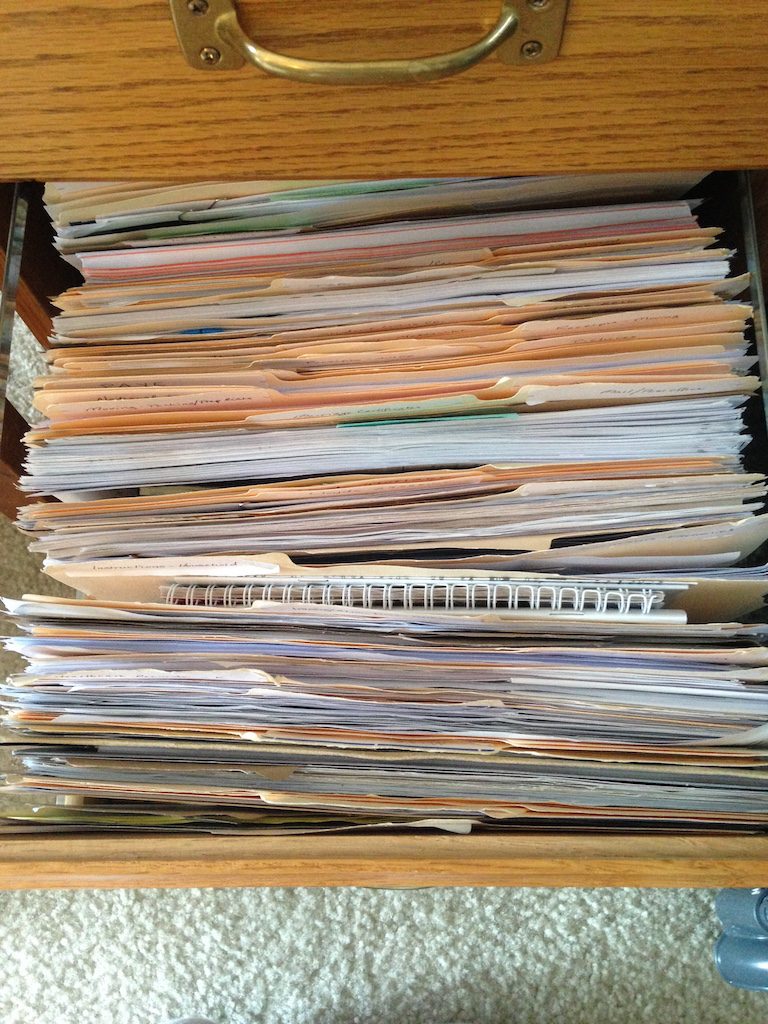
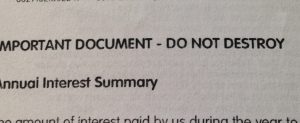
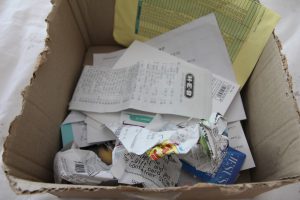
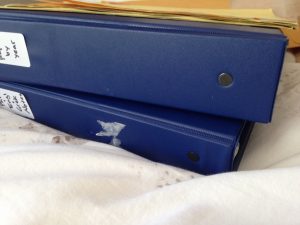
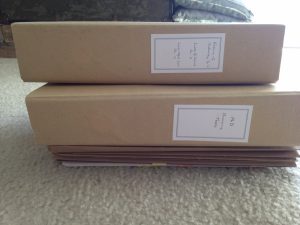
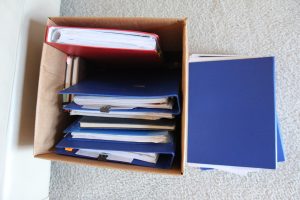
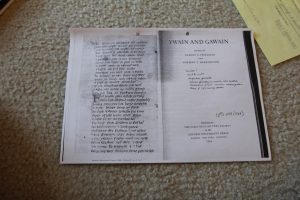
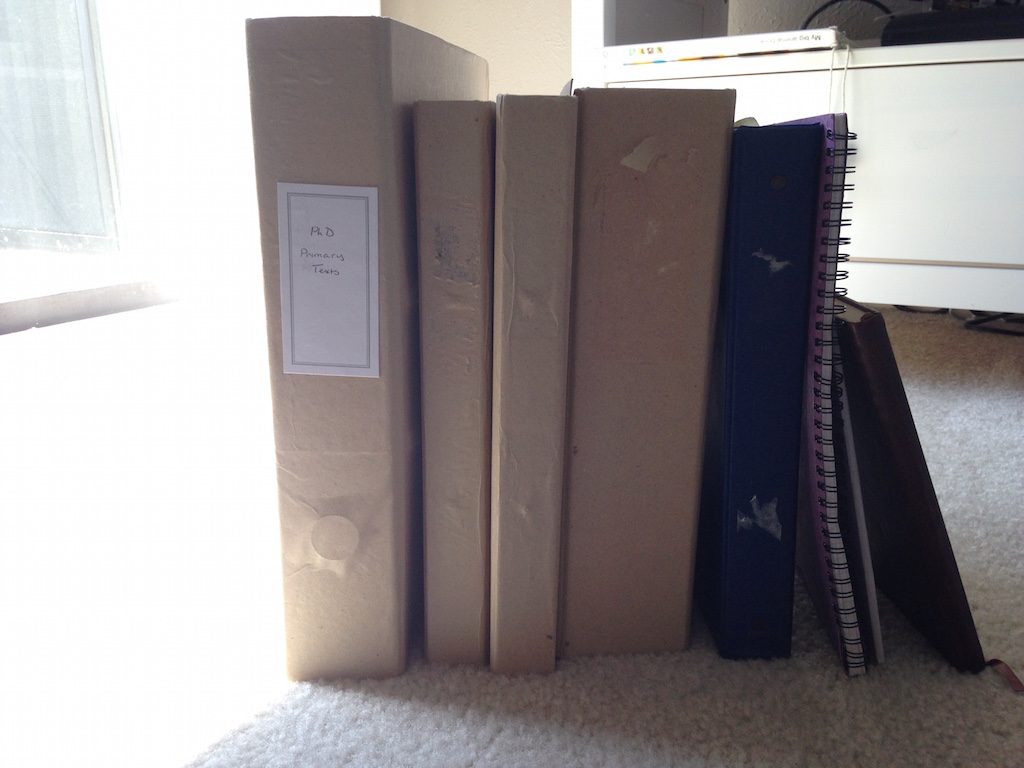
One thought on “Konmari: Papers”